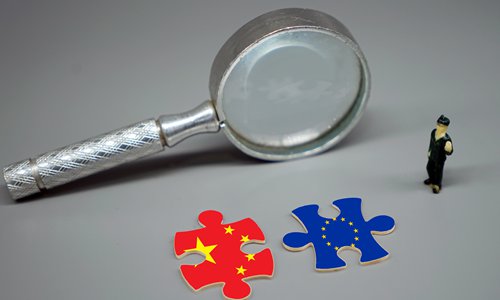HOME >> OPINION
After vote, will EU change approach to China?
By Wang Yiwei Source:Global Times Published: 2019/6/18 19:53:39

Photo: IC
Populism was given a cold shoulder in European parliament elections, lending traction to attempts at European integration. Now, important issues will receive more attention with focus moving back to climate change and data protection. In the meantime, due to disputes among populist parties and groups, it is getting more difficult for Europe to coordinate overseas policies.The EU elections have shown three major changes. First, the times have changed. Globalization has split regions and countries. The EU elections showed two trends - polarization and fragmentation. Both are typical of US politics but rare for Europe, where polarization manifests itself in the extreme right and extreme left.
Fragmentation is a result of rise of more political parties. Despite three or four or more parties sharing seats in the European Parliament, it is no longer the Europe we were familiar with. The direction and pattern of its development are changing.
Europeans learnt their lessons from two cases - Brexit and election of US President Donald Trump - and were motivated to safeguard European integration during EU elections. If it were not for Brexit and Trump, I'm afraid populism would have dominated the continent.
Many Europeans believe they are faced with three major challenges right now: Trump's unilateralism and the mess he created by pulling the US out of international organizations and treaties; the threat from Russia; and an "increasingly aggressive" China as the Belt and Road Initiative is extending in the continent.
Second, the West has changed. Europe is no longer just an ally of the US. It considers China a competitor. China figuring in the EU election campaign is something rarely seen in Europe.
China says it is a developing country but most European countries don't agree. Such issues will inevitably come up for discussion during the G20 summit on June 28 and 29 in Osaka, Japan. The group of 20 emerging economies will also take up the issue of reforms of the World Trade Organization.
Third, politics itself has changed, and is viewed with skepticism by an increasing number of Europeans. The political group Greens/European Free Alliance, which gained 22 more seats in this EU election, is composed primarily of young people who want the UK to remain an EU member. They support globalization and are all for European integration. In their view, only cross-border coordination can solve the problems faced by European countries.
However, the middle aged and elderly still dream of staying in countries which don't belong to a bloc. The shift between the two generations reflects the changing political spectrum of Europe.
Such being the case, China has undoubtedly become the scapegoat amid all these three changes. Globalization has caused an international split. While we are proud that China contributes one third of the global economic output, people from other parts of the world don't think so. They believe China has gained the most from globalization.
Some Europeans admire China's strong system and industrial policies, while others have a different view and don't think European socialist market economy can get along with China's so-called state capitalism.
The EU's attitude toward China hasn't changed much after the elections. Europe will become more demanding of China and its fear and skepticism of the Asian power is also set to rise. Therefore, China's policy toward Europe should focus on bilateral aspects. In the meantime, sub-regional collaboration like the 16+1 format and pragmatic cooperation in fields including 5G, energy and climate change should be strengthened.
Amid growing tensions with the US, Europe is more important for China. Although some European countries are small, their core technology prowess and advanced ideas are worthy of China's attention.
The US is trying to decouple from China and persecuting its technology business. It remains to be seen whether Europe can directly link with China, bring its good ideas and high technology to the Chinese market and make new norms for multilateral cooperation. There are new lessons for China to learn in its relationship with Europe and opportunities galore for both sides.
The author is a professor at the School of International Studies and director of the Center for European Studies, Renmin University of China. The article is an abstract of his speech at a roundtable discussion on Brexit, European Parliament Elections and the Future of China-UK and China-EU Relations organized by The Charhar Institute. opinion@globaltimes.com.cn
Posted in: VIEWPOINT